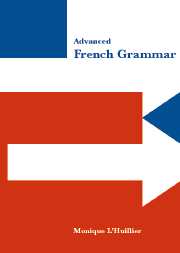Book contents
- Frontmatter
- Contents
- Acknowledgements
- Introduction
- 1 Framework
- 2 Verbs
- 4 Introduction to verbs
- 5 Present indicative
- 6 depuis and other tense markers
- 7 Future
- 8 Imperfect
- 9 Perfect
- 10 Past historic
- 11 Other past tenses
- 12 Subjunctive
- 13 Conditional and the expression of hypothesis
- 14 Imperative
- 15 Infinitive
- 16 Present participle
- 17 Past participle
- 18 Active and passive voices
- 19 Impersonal verbs and the impersonal voice
- 20 Pronominal verbs
- 21 Modals: devoir, pouvoir, vouloir
- 22 savoir and connaître
- 3 Determiners and prepositions
- 4 Nouns, pronouns and modifiers
- 5 Sentences and text
- Appendixes
- Bibliography
- Index
9 - Perfect
Published online by Cambridge University Press: 05 June 2012
- Frontmatter
- Contents
- Acknowledgements
- Introduction
- 1 Framework
- 2 Verbs
- 4 Introduction to verbs
- 5 Present indicative
- 6 depuis and other tense markers
- 7 Future
- 8 Imperfect
- 9 Perfect
- 10 Past historic
- 11 Other past tenses
- 12 Subjunctive
- 13 Conditional and the expression of hypothesis
- 14 Imperative
- 15 Infinitive
- 16 Present participle
- 17 Past participle
- 18 Active and passive voices
- 19 Impersonal verbs and the impersonal voice
- 20 Pronominal verbs
- 21 Modals: devoir, pouvoir, vouloir
- 22 savoir and connaître
- 3 Determiners and prepositions
- 4 Nouns, pronouns and modifiers
- 5 Sentences and text
- Appendixes
- Bibliography
- Index
Summary
Moins il est simple, plus il faut avec son passé composer
Introduction
The perfect tense is generally used to express past actions or events which are completed at the time of speaking but can have a bearing on the present. It often indicates when the action or event took place. There is no emphasis placed on the duration of actions or events (as expressed by the imperfect). However, reference may be made to the duration to indicate the completion of the event. The French perfect (passé composé) can be expressed by the present perfect, present perfect continuous or simple past in English.
Like other compound forms, the perfect has values of accomplished aspect and anteriority:
– as accomplished, it is opposed to the present, which is non-accomplished.
Ex: Elle est contente: elle a enfin trouvé la solution à son problème.
She's happy – she's found a solution to her problem at last.
– as anteriority, the perfect has the same aspectual values as the past historic.
Ex: Sylvain est parti pour l'Afrique en 1968.
Sylvain left for Africa in 1968.
The perfect is opposed to the imperfect in the following ways:
– if the perfect is used with its accomplished value, the imperfect represents the non-accomplished.
Ex: Quand il était à Las Vegas, Paul jouait beaucoup au casino. Maintenant, il a abandonné tout ça.
– if the perfect is used with its temporal value, the same opposition as that between imperfect/past historic is created.
- Type
- Chapter
- Information
- Advanced French Grammar , pp. 126 - 138Publisher: Cambridge University PressPrint publication year: 1999



